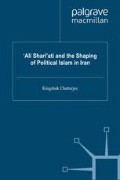Abstract
For better or for worse, the Pahlavi regime in Iran had become identified in the twentieth century with the country’s agenda of modernization. For a considerable part of the time, almost none of the major voices that could be heard in the country were opposed to the centrality acquired by the state in this scheme of modernization. All that was at issue for them was who/what should wield that state power. Thus, constitutionalists like Mosaddeq and Bazargan wanted a popularly elected representative body to be at the helm of the state,1 some traditionalist forces (such as the ‘ulema and the bazaar) preferred a system where the ‘ulema (and through them, the bazaar) would be able to exercise some restraint over state power, and radicals of the Tudeh party would prefer radical progressive elements to be in charge of that state apparatus in the Bolshevik fashion. But apart from Shari’ati, almost no one disputed that state power should be the principal agency of progress in the society.
Access this chapter
Tax calculation will be finalised at checkout
Purchases are for personal use only
Preview
Unable to display preview. Download preview PDF.
Copyright information
© 2011 Kingshuk Chatterjee
About this chapter
Cite this chapter
Chatterjee, K. (2011). The World as Tauheed: Envisaging an Islamic Alternative. In: ‘Ali Shari’ati and the Shaping of Political Islam in Iran. Middle East Today. Palgrave Macmillan, New York. https://doi.org/10.1057/9780230119222_4
Download citation
DOI: https://doi.org/10.1057/9780230119222_4
Publisher Name: Palgrave Macmillan, New York
Print ISBN: 978-1-349-29511-1
Online ISBN: 978-0-230-11922-2
eBook Packages: Palgrave History CollectionHistory (R0)

